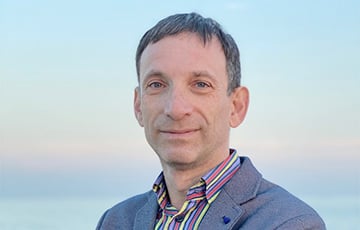Black Colonel
10- VITALY PORTNIKOV
- 6.01.2025, 10:05
- 18,182

Alksnis was right.
The former People's Deputy of the Soviet Union, Viktor Alksnis, was called 'Black Colonel' back in the days of the famous deputy congresses of Gorbachev's times – and this nickname, coined when we still remembered the dictatorship of the 'black colonels' in Greece, was so liked by Alksnis that he called his own telegram channel that way – yes, he lived to the times of telegram channels and died on January 1, 2025.
However, this text is not at all an obituary of Alksnis, which was almost not remembered either in Russia, where he lived most of his life and even was a deputy of the State Duma, or in Latvia, where he was declared undesirable for entry by a person much earlier than it was done in Ukraine. It's just that Alksnis's life is a reminder that the horror we live in now began much earlier than in 2022 or even in 2014. Moreover, this horror never ended.
Colonel Alksnis, the grandson of a brigade commander during the Civil War (he even graduated from the military school named after his grandfather), began to engage in politics just in the era of perestroika. But by what policy? He became one of the organizers of the Interfront Latvia just after the Latvian Popular Front appeared. It would seem, why did the personnel of the military need politics and why did Alksnis continue to feel so confident in uniform even when he was smashing General Secretary Gorbachev from the rostrum of the deputy congress? Now I know why. Because behind the colonel were people from the KGB, who made it clear that nothing threatened him. People from the KGB needed the Alksnis Interfront, they were interested in destabilizing the situation along the entire perimeter of the Soviet borders – from Estonia to Uzbekistan, and fueled conflicts as much as they could. Alksnis worked for this destabilization mainly, for creating conditions for a real dictatorship of the 'black colonel'.
And then I did not understand it and even tried to ask Alksnis. Once I asked him on the sidelines of a congress (and the colonel was always a fairly open person) why he was so ardently criticizing his own Commander-in-Chief. Alksnis replied with irritation that I do not ask such questions to his other colleagues – generals and marshals, although they are not enthusiastic about Gorbachev. Then I was switched, and I irritatedly said that these generals and marshals are Russians and are fighting for their state. Alksnis is Latvian, and when he reproaches Gorbachev for his 'softness' towards his own people and country, my consciousness turns off.
The 'black colonel' turned white, lost all his charisma and began to shout that if all these nationalists only tried to secede from the Union, they would lose half of the territory. Subsequently, I learned that with this concept, Alksnis and other leaders of the deputy group "Union" went with proposals to the Chairman of the Supreme Soviet of the USSR Anatoly Lukyanov. Then the idea of 'educating' recalcitrant republics by turning them into countries with disabilities arose. Then Moscow began to use the national question and the "protection of Russians" (Russian-speaking) as the main tool of its influence in the Soviet Union and the post-Soviet space. This simple concept was persistently implemented by everyone — Gorbachev, Yeltsin, Putin, Medvedev. Alksnis, we must give him credit, and after the collapse of the USSR, he remained an agent who worked for discord and destabilization. It was he who initiated the changes in the legislation that made it possible to issue Russian passports to residents of territories actually controlled by Russia – later Moscow will explain its presence in Moldova or its aggression against Georgia by protecting Russian citizens! It was he who in April 2005 in Simferopol called for "the return of Crimea to Russia" – and this was one of the obvious signals to 'orange' Kyiv. However, it is interesting that all these statements and actions of Alksnis — up to 1989 — were perceived as statements of a marginal who would never have power. So why pay attention to him?
But the task of people like Alksnis is not to be in power, but to clear the way for others. After all, Alksnis died in the very Russia he had dreamed of since the time of perestroika – aggressive, furious, ready for wars and destruction. And, maybe, if I had lived a few more years, I would have waited not only for the attack on Ukraine, but also for the attack on Latvia – who knows. The question is not even what kind of country he wanted to build – the question is what kind of country his curators from Lubyanka sought. That is why Alksnis' statements had to be taken seriously from the very first day. He was talking about a coup in the Soviet Union and the attempted coup really happened in August 1991. He talked about separating the territories from the 'disobedient' republics – and we are still living with agitated wounds. He promised an attack on Crimea — and the attack happened.
And Alksnis was not mistaken with the 'black colonel'. But another person became the 'Black Colonel' in his place. Putin became a real 'Black Colonel'.
Vitaliy Portnikov, zbruc.eu











